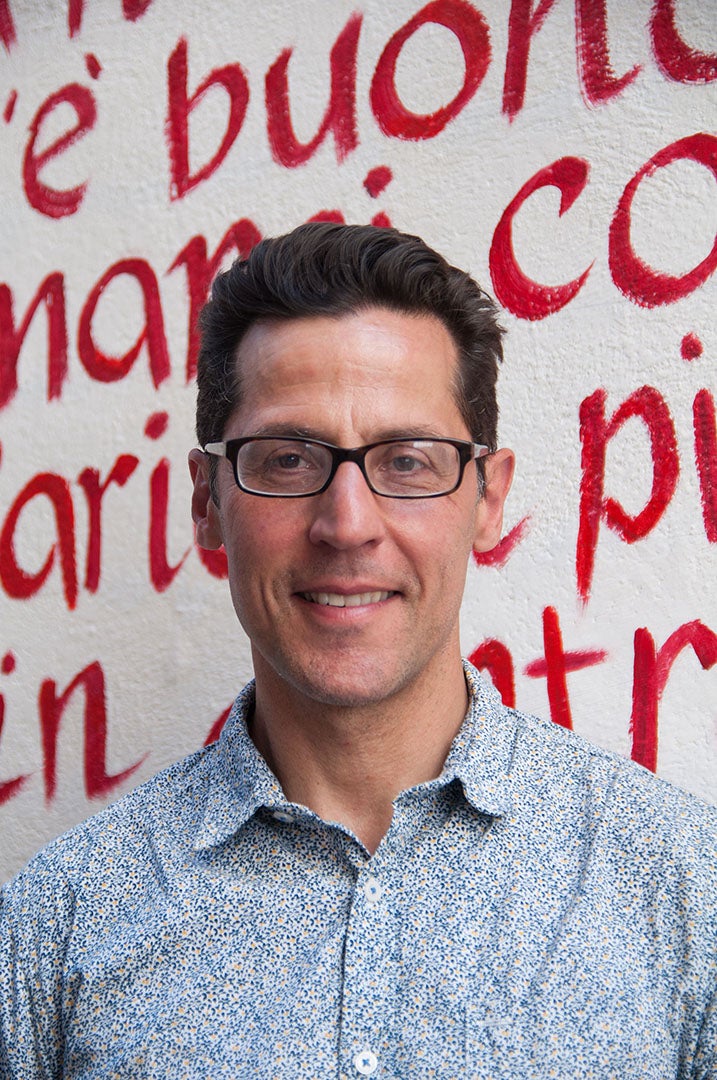KINGSTON, R.I. – Oct. 9, 2018 – Associate Professor of English Peter Covino’s four-year odyssey to bring the works of acclaimed Italian poet Dario Bellezza to an English-speaking audience has received a boost from the National Endowment for the Arts.
Covino, an awarding-winning poet himself, has been awarded a Literature Translation Fellowship from the NEA, one of 25 projects this year to receive a total of $325,000 in grants to translate works from 17 countries.
The Providence resident, the first to translate a majority of Bellezza’s body of poetry, earned the grant for his manuscript, “What Sex is Death?,” a translation of about 100 poems, some quite long, that provide an overview of Bellezza’s career – along with the first English translations of all of them.
“I think he was an amazing poet,” said Covino, who had previously translated about 30 of Bellezza’s poems for anthologies and literary journals. “But people were a little afraid of his work. He had become a persona non grata in Italy.”
Bellezza (1944-1996), a poet, novelist and playwright, was outspokenly gay and his poetry reflected that, along with attacks on societal norms and explorations of relationships, complex ideas about death, and spirituality. He reached the pinnacle of Italian poetry in 1976, winning the Viareggio Prize for his collection “Morte Segreta” (Secret Death). His work drew the attention of such Italian literati as renowned poet and filmmaker Pier Paolo Pasolini, whose murder in 1975 became a major influence on Bellezza’s work.
Covino became interested in Bellezza’s work in the 1980s while studying in Rome. Covino’s poetry teacher, novelist and poet Giorgio Bassani, had known Pasolini. He urged Covino to read Bellezza’s “Libro d’Amore” (Lovebook or Book of Love).
“One thing Bassani taught me is that when you are marginalized, when you’re an ‘other,’ all kinds of marginalization have similar experience,” Covino said. “He really turned me on to this idea of understanding the radical possibility of poetry to express this type of alienation.”
In the ‘80s, Bellezza’s poetry was still prominent in Italy, and “Libro d’amore” was one of the first books Covino read in Italian. “For me, it was my own initial struggle with feelings of identity,” said Covino. “Poetry was a nonthreatening way to express that.”
By the time Covino began more intensive work on “What Sex is Death?” in 2014, however, he faced a big hurdle. Just about all of Bellezza’s work was largely out of print.
“Bellezza went from being a major literary figure in the 1970s to becoming more or less vilified by the right in the ‘80s,” said Covino. “It was hard to find anything on Bellezza or his work for lots of complicated reasons. Gay identity was still emerging from the shadows. A lot of people weren’t open to it. The AIDS epidemic also hit in the ‘80s and that marginalized gay people even more.”
It wasn’t until 2015 that Italian publishing house Mondadori produced a comprehensive collection of Bellezza’s poems. But for much of his research, Covino pored over obscure Italian journals and bibliographic material and traveled to libraries in Rome and Florence to track down remaining copies.
Covino initially planned to translate one of Bellezza’s eight poetry books, or parts of one. But after reading all eight – about 800 pages of poetry – he decided to produce a collection that would provide an appreciation of Bellezza’s full career. “I’ve translated maybe double the amount that will fit in a book,” Covino said. “Some of them are really just beautiful, candid and gorgeous. And then others are really intense.”
Covino, whose translations of other Italian poets have been featured in such publications as Atlanta Review, Italian Americana and the anthology New European Poets, had to ensure that his English translations matched the intensity of Bellezza’s Italian verse. But Bellezza’s style varied wildly.
“He uses a lot of ornate and baroque language alongside very direct, matter-of-fact language in discussing issues of sexual identity and socio-political realities of the era,” Covino said. “That’s very challenging to translate. You don’t want it to be too ornate, or too direct and omit important resonances. You have to find a happy medium.”
Covino has selected 100 poems, approximately 150 pages for the book – currently about 320 manuscript pages, that include a comprehensive introduction and poems presented in their original Italian and English translation. The manuscript has received interest from several publishers.
Covino, author of three award-winning books of poetry, is also working on a new collection, “Armies in the Blood.”
The NEA project has awarded 480 fellowships since 1981, funding the translation of works from 83 countries. The 25 awards this year were selected from 104 applicants, with consideration given to the translator’s skill and the importance of the proposed work to English-speaking audiences.

